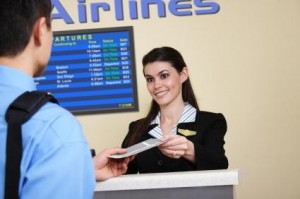Airline Careers Outlook
 The airline industry suffered during 2001, due to reduced air travel and a struggling economy in the early part of the year and then because of the terrorist attacks in the fall. Airline industry losses for 2001 were nearly the same as during the Gulf War in the 1990s when the United States experienced somewhat similar economic and political conditions. The Air Transportation Safety and System Stabilization Act (dubbed “the airline bill”) has kept some airlines from bankruptcy, but the industry needs air travel to return to its pre-terrorism volume. Many major airlines implemented cost-cutting measures, including employee layoffs. Some airlines are talking to unions to renegotiate wages and cut other costs. Smaller airlines that were already operating at lower costs, such as Southwest Airlines, JetBlue Airways, and Frontier Airlines, have fared better and remained profitable despite the recession.
The airline industry suffered during 2001, due to reduced air travel and a struggling economy in the early part of the year and then because of the terrorist attacks in the fall. Airline industry losses for 2001 were nearly the same as during the Gulf War in the 1990s when the United States experienced somewhat similar economic and political conditions. The Air Transportation Safety and System Stabilization Act (dubbed “the airline bill”) has kept some airlines from bankruptcy, but the industry needs air travel to return to its pre-terrorism volume. Many major airlines implemented cost-cutting measures, including employee layoffs. Some airlines are talking to unions to renegotiate wages and cut other costs. Smaller airlines that were already operating at lower costs, such as Southwest Airlines, JetBlue Airways, and Frontier Airlines, have fared better and remained profitable despite the recession.
Aviation experts predict that the airline industry will continue to suffer over the short term then begin to see a slow recovery as passengers get back on board.
While the airline bill took care of the carriers, it didn’t offer any help to the almost 100,000 laid-off workers. Some airlines did not offer severance packages. Some options being considered include requiring airlines to pay severance as a precondition of receiving government aid or loan guarantees. This would help only those who are eligible for severance under the stipulations of their union contracts. About 55 percent of airline employees are not covered by union contract.
Terrorism has also affected aircraft manufacturing. In recent years, the industry has been hurt by a decreased defense budget. However, the Defense Appropriations Bill for fiscal year 2005 provided $416.2 billion in new discretionary spending authority for the Department of Defense. The budget includes spending for weapons; aircraft; shipbuilding; ballistic missile defense; intelligence, surveillance, and reconnaissance, military personnel pay raises and medical programs; troop readiness and sustainment programs; and other programs.
Manufacturers that serve commercial airlines are laying off workers and some may close plants because new aircraft orders have been stopped or delayed. General aviation manufacturers were also affected, although the number of active general aviation aircraft was expected to remain about the same as in past years.
Many small airports have gone out of business in recent years, and many more are expected to fail, especially those unable to keep up with advancements in technology as they become standard in FAA regulations. As the industry developed the hub-and-spoke services, some airports have seen dramatic decreases in air traffic; others, particularly larger airports, have seen a boom in the number of flights and passengers they handle each year. These airports will continue to require large numbers of employees. Airport employees will have to undergo security checks and complete more rigorous training in order to comply with new government safety and security regulations.
The FAA is in the process of completing its transition to a new air traffic control system. Many of its computers, state-of-the-art in the 1960s, are less powerful than most personal computers today. With more and more airlines adopting global positioning system (GPS) equipment, the need for tight air traffic control will be eliminated. The role of the air traffic controller will be reduced to provide assistance during potentially dangerous and emergency situations. Strong growth will be seen in the number of jobs related to computer development and operation.
Airline Careers List:
- Agricultural Pilots
- Air Traffic Controllers
- Aircraft Mechanics
- Airplane Dispatchers
- Avionics Engineers and Technicians
- Flight Attendants
- Helicopter Pilots
- Pilots
- Reservation and Ticket Agents
